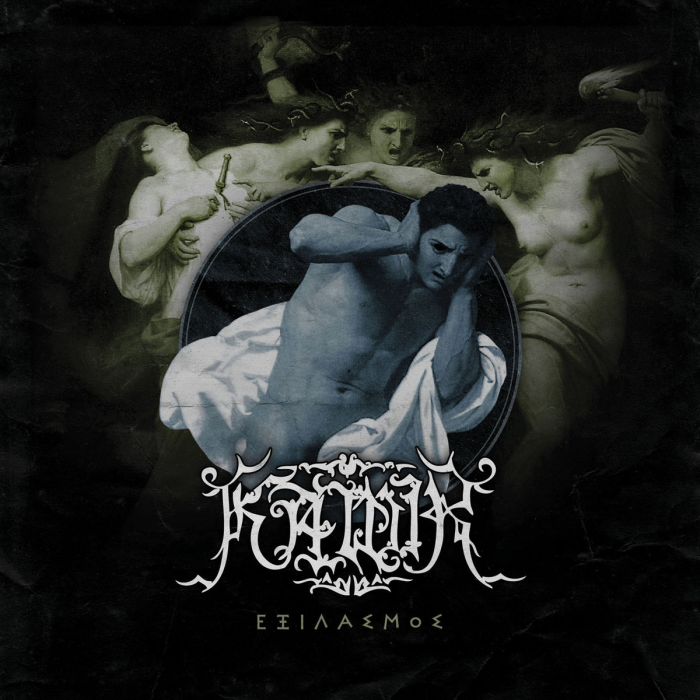
Exilasmos (meaning ‘propitiation’) is the 7th album by Hellenic black metal band Kawir. This album signifies a dynamic return for the group with a very energetic blend of classic heavy metal and black metal, revealing glimpses of their way forward among the overused tropes of both genres.
The riffing relies a lot more on the Phrygian and generally more sinister modes and the lyrics reflect a darker subject matter, since the focus shifts from the Gods to the blasphemous anti-heroes and villains of the oldest tales of Greek mythology. The band wrote and recorded the songs faster than usual, under the fresh inspiration of their tours beyond the sea and this has aided them to manifest their newfound language in dramatic expression through powerful and varied vocal performances and dense guitar sound.
The element that sets this record apart from the rest of Kawir’s discography is the abundant heavy metal technical and structural conventions: for the first time, a solo appears in their discography. The subtle Iron Maiden influences shine on the leads yet sadly some songs do not venture far from where they began. On the bright side, those ideas become perfectly assimilated within the sonic identity of the band and successfully maintain the bleak atmosphere of the songs.
From a purist black metal perspective though, there is too much ‘mosh’ on this record [1]. Apparently, that was the goal, as the band toured extensively around the globe and after the boring Pater Ilie, Metera Selena they wanted to explore new paths and get the audience going. In their own words:
Returning from the tour in Latin America we had a lot of energy, so we sat down in three days and we wrote one song after the other. We decided it was okay to release this album earlier. This was partly because the fans there gave us the energy and thus it became more extreme. ~ Therthonax, interview for Under the Sign of Metal zine
Sadly, there still is low divergence in such a classic approach and the band on some parts of the first half of the record flirts with the obvious, something which is not bad, but it’s not great either.
In the end, this proved to be a step in the right direction towards self-discovery, since it shows why Isotheos was such a masterpiece; for it lied in a happy medium between the contemplative reverence of Pater and the youthful energy of Exilasmos. Truly, Aristotle is validated when he said that excellence lies in the middle [2].
Overall, with Exilasmos, Kawir manage to widen their audience and prove their desire for evolution. We can hope that one day, they will eventually re-approach the summits of their best work and perhaps even surpass it. Until then, here is a song, that could indicate the path ahead for this band (guest vocals by Alexandros of Macabre Omen):
If anyone, from reasoning, exclaims loudly that victory of Zeus,
Then they have acquired an understanding of all these things;
Of he who guided mortals to reason,
Who laid down that this possesses authority:
Learning from adversity.
Aeschylus: Agamemnon,174-183
On the lyrics, tragedy and metal:
Exilasmos is the appeasing of divine wrath. It has to do with all those disrespectful heroes, who with their monstrous deeds, infuriated Zeus, and he in turn cursed them, by either sending them into eternal torment in Hades or by cursing their entire bloodline. It is a concept album about two well known and tragic houses, House Lavdakides and House Atreides, probably the most tragic house ever. ~ Therthonax
Lycaon is the mythical first king of Arcadia. He boiled his own child and served it as dinner and sacrifice, in order to test Zeus. Zeus turned Lycaon and his 50 sons into werewolves. Their curse would only be broken if they managed to not eat meat for 9 years.
Tantalus, stole the nectar and ambrosia, roasted his own child and sacrificed it to the gods. Hence the curse of House Atreides begins.
Thyestes and Atreus are the grand-children of Tantalus. Thyestes was cast away by Atreus for trying to usurp him. Afterwards, Atreus slaughtered his brother’s children and offered them to him as dinner. Of those children, only Aegisthus survived and swore revenge.
Agamemnon, one of the biggest heroes of the Trojan war, son of Atreus, returns after years as a victor from Troy, only to be assassinated by his wife and Aegisthus.
Finally, Orestes, the son of Agamemnon returns and kills his mother and Aegisthus and avenges his father.
Terror abounds in those old myths from whom the spirit of tragedy arises as Dionysian wisdom through Apollonian artifice. For Nietzsche the excess of a bliss born in pain and suffering was the comprehensive tragic vision, a discordant note that nevertheless affirmed the belief of the Greeks in the goodness of existence.
Replace the word ‘tragedy’ with the word ‘metal’ and you have all you need to know.
Footnotes:
[1] ‘No fun, no core, no mosh, no trends’ still remains a fine compass to differentiate between the great and the good in black metal. Check also https://www.deathmetal.org/article/no-mosh-no-core-no-trends-no-fun/
[2] Of course, Aristotle’s genius lies in the fact that this happy medium, wherein virtue lies, is unique for each person according to his temperament. Moreover, he claimed that the potential for virtue lies within all of us. For more instructions on how to succeed in life, rule your city-state or possibly conquer Asia if your name is Alexander, check out Nicomachean Ethics, a really great book that needs no recommendation.


In that photo, why are those naked women yelling at naked Elvis?
and Enough about the Greeks!
Watch Rome (TV Series 2005–2007) and admire Polly Walker’s naked breasts while listening to Paul Chain or Necrodeath.
πάθει μάθος (pathei mathos)
Of this, David Wulstan Myatt writes:
https://davidmyatt.wordpress.com/from-aeschylus-to-the-numinous-way/
Interesting choice for an album cover.
Its so very… Greek.
The guy on the cover looks like Justin Trudeau!!